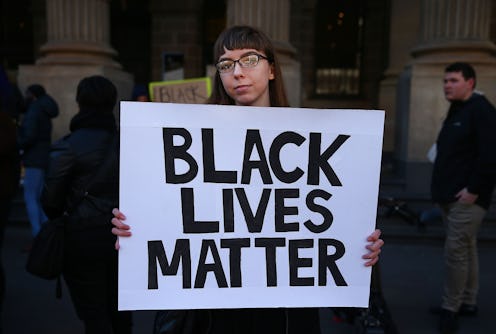News
How BLM's Agenda Could Affect The Election
This time last year, the phrase "black lives matter" was largely relegated to protest chants and activist signs. Now, with the appearance of the "Mothers of the Movement" at the Democratic National Convention, not to mention the police-involved killings of Alton Sterling and Philando Castile earlier this summer, the phrase is now backed by political might. On Monday, Aug. 1, the Movement For Black Lives, a coalition of organizations involved in organizing around the concept that black lives matter, released their platform that outlined what they demand as a coalition. With the attention paid to the movement after the "Mothers of the Movement" spoke at the DNC, some might wonder if The Movement for Black Lives platform will affect the election in November.
Released ahead of the two-year anniversary of the death of Michael Brown in Ferguson, Missouri (the event that acted as the organizing catalyst for the BLM movement), the platform called for multiple large-scale changes made in the treatment of African-Americans, including, but not limited to, "those who are women, queer, trans, femmes, gender nonconforming, Muslim, formerly and currently incarcerated, cash poor and working class, differently-abled, undocumented, and immigrant."
The Movement for Black Lives demands, which range from community self-determination to investment in the health of black people to reparations for slavery and colonialism, also include policy proposals aimed at politicians and policymakers.
As the nation looks forward to the presidential election in November, these demands could have a large impact on the progressive voting bloc that once constituted Bernie Sanders supporters.
With the current political climate in mind, I see four potential outcomes for the political response to The Movement for Black Lives platform release, and unfortunately, the only positive one is also the most idealistic. The ideal response would be, of course, that politicians, from those campaigning for the presidency down to those working to win city council positions, would holistically take in the agenda (rather than just reading headlines, most of which merely mention reparations and an end to the death penalty), consider it with their policy advisers, and work it into their campaigns. I could see this working for mid-level races, such as those for state senate and house races in liberal states, maybe.
The second hypothetical response is one that could be undertaken by Hillary Clinton and her brand of Democrat: they will pay lip service to BLM, discuss the importance of "the movement," and perhaps mention a few of the "less radical" points from the agenda during speeches. It wouldn't be the first or the last time a grassroots movement had been co-opted for mainstream political gains: From the civil rights movement of the 1950s and '60s to Occupy Wall Street, the language and organizing power of radical movements has regularly been used by those in power (typically by more left-leaning groups) to garner electoral support. To their credit, groups affiliated with Black Lives Matter have already rebuffed this type of "endorsement" by saying the Democratic Party "won't bring the changes we seek."
The third likely response is that which will be issued by Donald Trump and his horde of Trumpistas (if they can stop bashing Khizr Khan or Clinton for a few minutes). They will call BLM "terrorists," bring up the police officers targeted at BLM protests in Dallas and Baton Rouge, and perhaps discuss reparations in a joking manner (or say that white Americans are somehow "not responsible" for slavery, as if violent, lethal racism ended with the emancipation proclamation). Unfortunately, some Twitter users have already jumped on this bandwagon.
The final response is that politicians and policymakers will ignore the demands being made by Black Lives Matter-affiliated groups. They will continue about business as usual, denying with their silence that their policy decisions could contribute to a system that regularly allows police to shoot dead innocent black people. They may do so out of ignorance, out of bigotry, or out of fear.
Like the AIDS epidemic of the 1980s, when President Ronald Reagan's lack of response to the epidemic started the "Silence Equals Death" movement, there is a long history of those who hold or seek elected office refusing to comment on important issues. Even now, both Republican vice presidential pick Mike Pence and Democratic VP nominee Tim Kaine have yet to speak publicly about BLM, further proving that controversial issues are not viewed as politically expedient.
The first three scenarios would all result in the message being spread — some will listen, some will deride, but all will hear. Although right-wing criticism and an overall bias against direct action activism can and will affect the way some otherwise-sympathetic people will view this agenda, it will at least plant the seed that Black Lives Matter is here to stay. The latter is the worst-case scenario, a blip in the radar as politicians and policymakers continue to obsessively follow the fear and loathing circus that is the 2016 presidential election.
Ultimately, the treatment of the platform is up to us, the electorate. Will we hold our elected officials to the standards so many people put forward to help achieve a more perfect union? Only time will tell.
